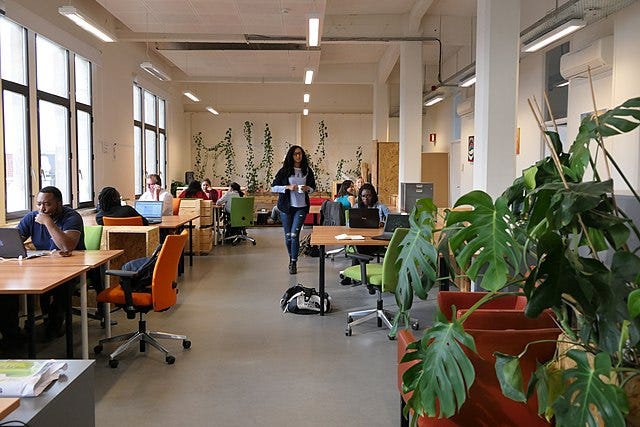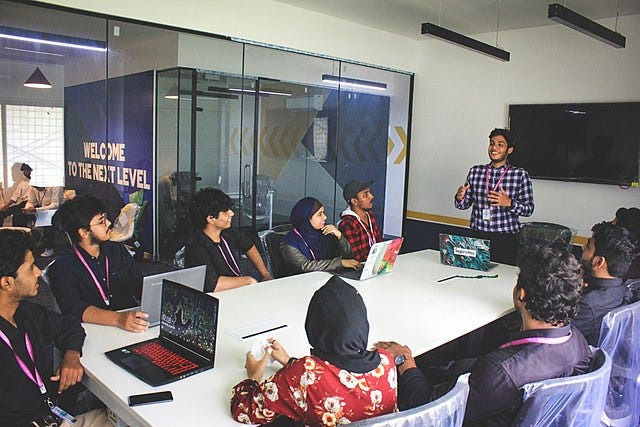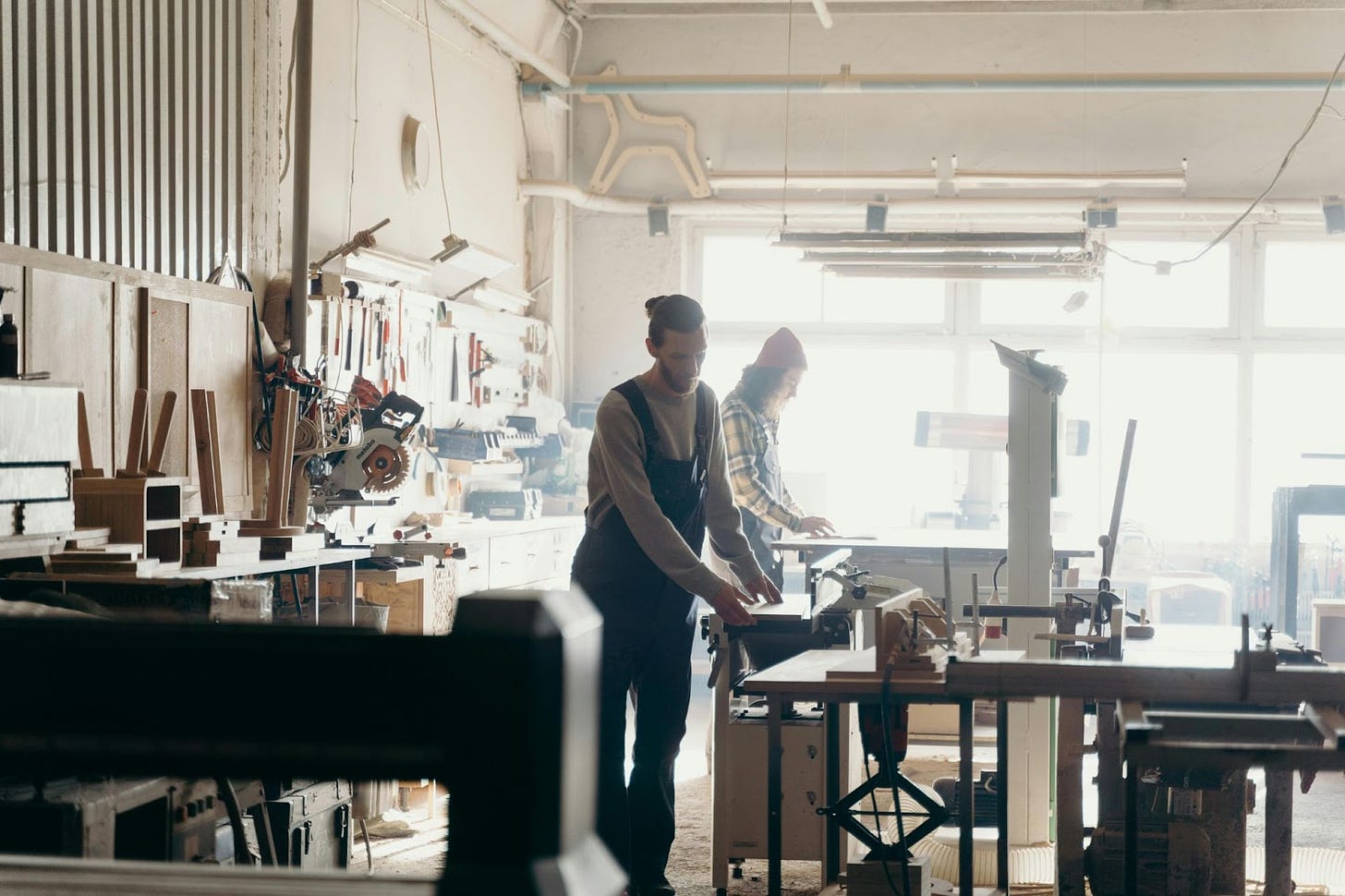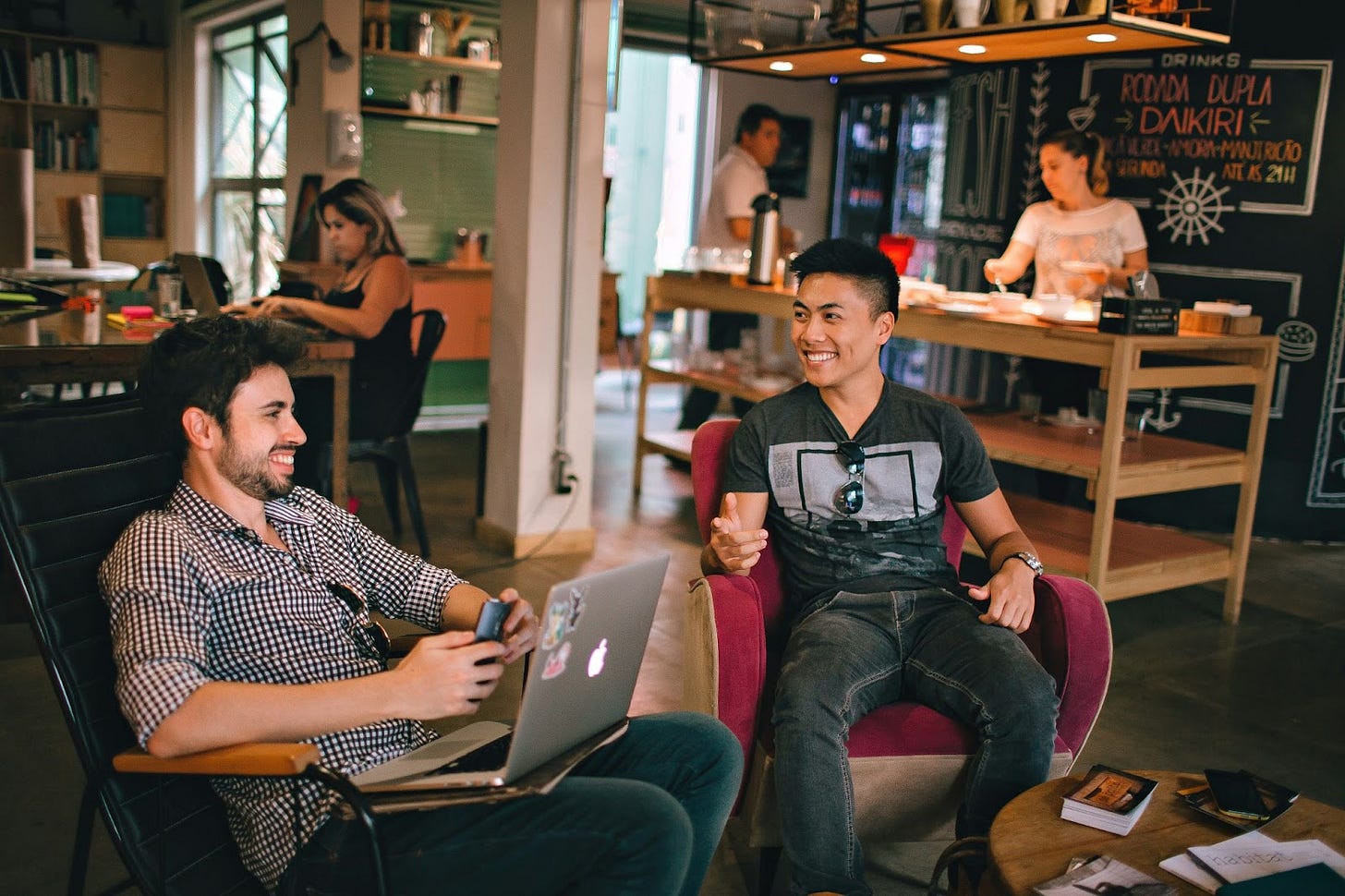Community Workspaces: Where Coworking Meets Opportunity
Find Out How Shared Community Workspaces Support Creativity and Mutual Empowerment.
In the face of growing economic inequality, mutual aid has expanded beyond traditional forms of support like food sharing and housing co-ops. Community workspaces are becoming vital hubs where people share resources, ideas, and skills to build a collective future. These workspaces encourage mentorship, entrepreneurship, and access to tools often reserved for those with wealth and privilege.
Even remote workers appreciate a place to get work done away from home. Some describe freelance work as alienating, but working together as we soon describe helps alleviate that. They also make great low-cost places to start non-profits or cooperatives. Perhaps they want a distinction between home life and work life. Working in a shared space with others fills many needs as we shall soon see.
Technology keeps transforming how we work, and the traditional office space has evolved. These shared environments—from coworking spaces to business incubators and even public libraries—offer a unique opportunity for individuals and communities to unite and support one another in their professional and creative endeavors. Take a moment as we explore different ways to work together.
Coworking Spaces: A Modern Take on Collective Work
Photo by WAO Coworking via Wikimedia
Coworking spaces represent a modern form of community empowerment. They offer affordable (or free), shared environments where community organizers, freelancers, remote workers, and small business owners can access office-like amenities—desks, conference rooms, internet, coffee—without the burden of renting an entire office. The same goes for community organizers, worker unions, and civic organizations.
But beyond practicality, coworking spaces foster social mobility, networking, and solidarity. They break down the isolation many people experience under capitalism and create communities built around mutual support. Coworking allows skills and expertise to be shared that would otherwise be limited to generational transfer between kin.
Many coworking spaces also focus on specific industries or groups, such as tech startups, artists, or marginalized communities. By lowering barriers and creating inclusive environments, coworking spaces enable those often excluded from traditional office settings to thrive.
Business Incubators and Accelerators: Nurturing Emerging Enterprises
Photo by Abdur Rahman Bin Salem Baseba via Wikimedia
For budding entrepreneurs, access to mentorship, resources, and a physical space to grow their ideas can be challenging. Business incubators and accelerators provide a solution by offering affordable workspaces with essential business development tools such as funding opportunities, mentorship programs, and networking events.
These spaces serve as launching pads for new businesses, offering everything from marketing advice to legal assistance. Particularly in underserved communities, incubators and accelerators act as lifelines, helping entrepreneurs build sustainable ventures while contributing to the local economy.
Frequently, we see business accelerators and incubators included as part of a greater organization. Cities, universities, and industry subsidize such programs to cultivate and scout for talent. They allow localities to generate long-term tax revenues from their initial support of successful businesses, and several modern companies got their start this way.
Public Libraries: Democratizing Workspace Access
Photo by DC Studio via Shutterstock
Public libraries are often overlooked as community workspaces, but they offer a unique form of mutual aid. With free access to technology, meeting rooms, and coworking-style spaces, libraries democratize access to resources that would otherwise be too expensive or out of reach for many people.
Plus, more people getting library cards justifies more funding. Who doesn’t support public libraries? They are one of the last bastions of sanctuary amidst the capitalist hellscape which engulfs us. Whether you’re lonely, want a quiet space to read, or have no place to go, libraries offer that to everyone for free at the point of service.
Many libraries have expanded their services to include digital tools like computers, printers, and podcasting equipment. Some allow you to borrow wifi-enabled portable routers or laptops. In doing so, they create equitable opportunities for people from all walks of life to work, make, and learn.
Where I live, the Rutherford County Library System provides multiple branch locations across town. Among them is the Technology Engagement Center. It allows people with library cards to access free services - like 3D printing, seed sharing, classroom space, or their community garden. I visited that location a while back to record a podcast with some master gardeners about community gardening in Tennessee.
Makerspaces and Other Models
Photo by cottonbro studio via Pexels
Another growing form of mutual aid workspace is the Makerspace. These community-run workshops provide access to tools like woodworking machines, laser cutters, and sewing equipment, allowing people to create, prototype, and coordinate projects. Others may offer screen printers, art supplies, or PC-building components.
Like public libraries, many makerspaces operate on a pay-what-you-can model or offer sliding-scale memberships, ensuring equitable access to resources. Similarly, community kitchens provide shared cooking spaces for aspiring chefs, seasoned foodies, and budding entrepreneurs to experiment.
Many of these spaces operate on a sliding-scale or membership basis, making them accessible to more people. These shared spaces allow aspiring chefs, bakers, and food entrepreneurs to test out ideas, try new foods, and share equipment that would be too expensive to purchase individually.
Community Workspaces in Mutual Aid
Photo by Helena Lopes on Unsplash
Community workspaces are more than just places to work—they are places where mutual aid thrives. These environments enable individuals to share resources, skills, and knowledge, fostering a culture of solidarity and collective support.
They allow us to interact with our neighbors again. This begins restoring a sense of community where our communities have been ravaged by the increasing demands of capitalism on our labor and its value. Great progress often comes from interactions with people from different experiences or backgrounds.
By offering affordable, flexible, and inclusive workspaces, these community hubs help reduce barriers to success and create opportunities for everyone to contribute to and benefit from the local economy. These workspaces provide real solutions to inequality, empowering individuals and building resilient, cooperative communities.
Beyond Darwinism - Mutual Aid Index
Beyond Survival of the Fittest: Kropotkin's Vision of Mutual Aid
What is the role of solidarity and reciprocity in building equitable and sustainable communities?
Mutual Aid Among Plants and Animals: Cooperating for Survival
Peter Kropotkin Observes How Cooperation Among Species Improves Survival and Shapes Evolution.
Frolics and Barn-Raisings: Mutual Aid Amongst the Amish
Take a Look at the Amish Traditions of Collective Action and Solidarity.
The Arab Spring: Mutual Aid in the Fight for Freedom
See Solidarity in Action with the Collective Struggle for Liberation in the Arab Spring Movements.
The Black Panther Party’s Legacy of Community Empowerment Through Mutual Aid
The BPP protected and served their communities despite rampant racism and being the main targets of the FBI’s Counter-Intelligence Program.
Blessing Boxes: Mutual Aid in Our Communities Today
Find Out How These Simple Free Community Pantries Transform Neighborhoods and Promote Solidarity.
Childcare Collectives: A Modern Expression of Mutual Aid
Childcare Collectives develop when families, friends, and neighbors pool their resources to raise children.
Feeding Hope: The Impact of Community Fridges as Mutual Aid
See How Grassroots Efforts Like Chattanooga’s Hope Community Fridge Transforms Food Access and Fights Food Apartheid.
Grow Food Together: The Impact of Community Gardening as Mutual Aid
Shared Gardens Enhance Food Security, Build Community Bonds, and Promote Well-being Without Personal Expense.
Community Self-Defense: Protecting Ourselves and One Another
Let’s Talk About How Communities Work Together to Protect Themselves From Harm Inflicted by the State and Fascists.
Community Workspaces: Where Coworking Meets Opportunity
Find Out How Shared Community Workspaces Support Creativity and Mutual Empowerment.
Deciding Together: The Consensus Model in Mutual Aid
How Collective Decision-Making Builds Strong and Resilient Movements As Shown by Occupy Wall Street.
Live Together, Thrive Together: Shared Housing as Mutual Aid
Imagine Housing as a Way to Build Community and Share Resources.
Breaking Bread, Building Bonds: What’s Cooking in Community Kitchens?
Learn How These Shared Kitchens Create Lasting Change Through Healthy Meals, Cooking Education, and Mutual Aid.
Migration and Mutual Aid: Navigating a Climate Crisis Together
The USA and Global North Grew Rich Burning Fossil Fuels. Radical Cooperation Can Help Us Adapt to a Changing World.
Forgive Us Our Debts: How Debt Collective Helps Abolish Financial Servitude
Debt Collective Branched Off From Occupy Wall Street and Unifies Debtors in Mutual Aid for Collective Liberation.
Thou Doth Protest? How The Diggers Reclaimed the Commons and Fought Early Capitalism
Learn About the Radical Solidarity and Resistance to the Enclosure of the Common Lands in 17th-Century England.
A World Without Barriers: Consider Accessibility in Mutual Aid
Everyone Becomes Disabled if They Are Lucky. So How Can We Make Our World More Accessible?
Mutual Aid in the Eye of the Storm: Disaster Relief Amid Climate Change
When Disaster Strikes, Mutual Aid Responds: A Blueprint for Resilience Amid More Frequent Catastrophes
Beyond the Ballot Box: Build Dual Power for Real Change
Empower People Through Mutual Aid, Solidarity, and Community Control.
Communities of Care: How Solidarity Transforms Support for Elders and the Differently-Abled
How Can Mutual Aid Principles Change Elderly and Disabled Care From Isolation to Connection?
Growing Resistance: How Food Forests Feed Communities for Free and Defy Capitalism
From Commodities to Commons: The Radical Potential of Agroforestry
Roots of Resilience: Black Mutual Aid Societies in American History
Explore W.E.B. Du Bois’ Work and the Heritage of Solidarity Among Black Folk.
From Despair to Dignity: The Radical Work of Free Clinics
How Mutual Aid and Community Solidarity Transform Access to Healthcare
Feeding Each Other: The Radical Power of Free Grocery Stores
How This Kind of Mutual Aid Transforms Hunger Relief into Community Empowerment
Challenge Capitalism One Free Store at a Time
How Free Stores Empower Communities and Challenge Scarcity
The Past & Future of Self-Governance: How General Assemblies Build Dual Power
Strengthen Communities Through Direct Democracy and Mutual Aid
Let Joy Guide You: The Power of Fun in Change Work
Explore the Role of Laughter, Creativity, and Connection in Community Organizing
Fascism Unmasked: How to Recognize and Resist Modern Authoritarianism
Empower Your Resistance: A Practical Guide to Revolutionary Optimism, Mutual Aid, and Defying Totalitarians
Resist Burnout: Care, Coping, and Wellness in Dark Times
How can we practice self-care to endure the revolutionary marathon and better support one another?
Resistance Anthems: Protest Music for Hard Times
Let’s Unite Our Voices For Justice Through the Power of Music!
Affinity Groups: Decentralized Resistance in an Age of Crises
How Do Small, Autonomous Collectives Build Power and Resistance Against Fascism, Capitalism, and Collapse?
Share a Feast: How Potlucks Build Community and Connection
Let’s Discuss How Sharing Food Nourishes Both Bodies and Bonds Across Generations.
Notes From the Underground: How Forests Teach Mutual Aid
How Do Fungi, Trees, and Other Plants Thrive Through Cooperation and Reciprocity?
Fight Book Bans with Little Free Libraries
How Do Little Free Libraries Turn the Tide Against Book Bans and Censorship?
Read, Rest, Revolt, Repeat: Study Groups as Mutual Aid
How Does Collective Study Build Power, Sharpen Strategy, and Sustain Movements?
Burn After Reading: Comms Discipline for Mutual Aid and Resistance
Think About Encryption, VPNs, Walkie-Talkies, and the Lost Art of Keeping Your Mouth Shut.








Lots of good stuff. I need to come back to finish the videos. Thanks, Jon.